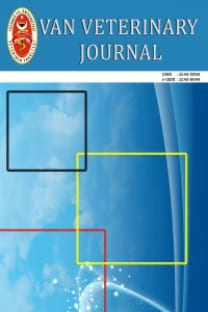Bir Oğlakta Kafa Travmasına Bağlı Gelişen Olası Amnezi Olgusu
Travmatik
beyin hasarına bağlı olarak insanlarda ve hayvanlarda değişen derecelerde
bilinç kaybı ve azalması, zihinsel durum değişiklikleri ve intrakraniyal
lezyonlar şekillenebilmektedir. Sunulan çalışmada, klinik muayenesinde
nörolojik bulgular saptanan 20 günlük Saanen
ırkı bir oğlakta kafa travmasına bağlı olarak gelişen olası amnezi olgusu ve
sağaltım girişimlerinin değerlendirilmesi yapıldı. Sonuç olarak travma geçmişi
olan hastalarda sağaltım girişimi açısından beşerî hekimlikte ve hayvan
modellerinde kullanılan travma skala ve testlerin rutin uygulamaya sokularak
prognozun belirlenmesinde yardımcı olabileceği düşünüldü.
Head Trauma Induced Probable Amnesia in A Goat Kid
Traumatic brain injury might be cause
varying degree of amnesia, changes in mental status and intracranial lesions
can be formed both in humans and animals. In the present study, the probable amnesia and treatment interventions due to head trauma with
neurological findings were evaluated in a 20-day Saanen goat kid. In conclusion, it has been suggested that trauma scales and tests which used in human medicine and
animal models can help to determine the prognosis by routine application in
patients with traumatic history.
___
- Beltran E, Platt SR, McConnell JF, Dennis R, Keys DA, De Risio L (2014). Prognostic value of early magnetic resonance imaging in dogs after traumatic brain injury: 50 cases.J Vet Intern Med,28 (4), 1256-1262. Berthelin CF, George LW (2015). Rabies In: Large Animal Internal Medicine, Smith BP (Ed), 943-945, Elsevier Mosby, St Louis. Chen HJ, Xu C, Li Y, Chen Z, Li GH, Duan Z, Li BC (2015). An open air research study of blast-induced traumatic brain injury to goats. Chin J Traumatol, 18 (5), 267-274. Constable PD (2004). Clinical examination of the ruminant nervous system. Vet Clin North Am Food Anim Pract, 20 (2), 185-214. Dewey CW (2000). Emergency management of the head trauma patient. Vet Clin North Am Food Anim Pract, 30 (1), 207–225. Fecteau G, George LW (2004). Bacterial meningitis and encephalitis in ruminants. Vet Clin North Am Food Anim Pract, 20 (2), 363–77. Geist V (1971). Mountain sheep. A study in behavior and evolution. University of Chicago Press, Chicago. Ghajar J (2000). Traumatic brain injury. Lancet, 356 (9233), 923–929. Green SL, Smith LL (1992). Meningitis in neonatal calves: 32 cases (1983-1990). J Am Vet Med Assoc, 201 (1), 125–128. Hunter GD (1974). Scrapie. Prog Med Virol, 18, 289–306. Jaslow CR, Biewener AA (1995). Strain patterns in the horncores, cranial bones and sutures of goats (Capra hircus) during impact loading. Journal of Zoology, 235 (2), 193-210. Kecskemeti S, Bajmocy E, Bacsadi A, Kiss I, Bakonyi T (2007). Encephalitis due to West Nile virus in a sheep. Vet Rec, 161 (16), 568–569. Li BC, Li Y, Xu C, Wang J, Chen Z, Li G, Feng H (2014). Blast-induced traumatic brain injury of goats in confined space. Neurol Res, 36 (11), 974-982. Lu D, Qu C, Goussev A, Jiang H, Lu C, Schallert T, Chopp M (2007). Statins increase neurogenesis in the dentate gyrus, reduce delayed neuronal death in the hippocampal CA3 region, and improve spatial learning in rat after traumatic brain injury. J Neurotrauma, 24 (7), 1132–1146. Lyeth BG, Jenkins LW, Hamm RJ, Dixon C, Phillips LL, Clifton G, Hayes R (1990). Prolonged memory impairment in the absence of hippocampal cell death following traumatic brain injury in the rat. Brain Res, 526 (2), 249-258. Mackay RJ, Van Metre DC (2015). Diseases of the nervous system In: Large Animal Internal Medicine, Smith BP (Ed), Elsevier Mosby, St Louis. Mahmood A, Goussev A, Kazmi H, Qu C, Lu D, Chopp M (2009). Long-term bene ts after treatment of traumatic brain injury with simvastatin in rats. J Neurosurg, 65 (1), 187–192. Millen JE, Glauser EL, Zimmerman M (1980). Physiological effects of controlled concussive brain trauma. J Appl Physiol, 49 (5), 856-862. Millen JE, Glauser FL, Fairman RP (1985). A comparison of physiological responses to percussive brain trauma in dogs and sheep. J Neurosurg, 62 (4), 587-591. Platt SR, Radaelli ST, McDonnell JJ (2001). The prognostic value of the modified Glasgow Coma Scale in head trauma in dogs. J Vet Intern Med, 15 (6), 581-584. Sasai H, Fujita D, Tagami Y, Seto E, Denda Y, Hamakita H, Sasai K (2015). Characteristics of bone fractures and usefulness of micro–computed tomography for fracture detection in rabbits: 210 cases (2007–2013). JAVMA, 246 (12), 1339-1344. Shultz SR, McDonald SJ, Haar CV, Meconi A, Vink R, van Donkelaar P, Christie BR (2016). The potential for animal models to provide insight into mild traumatic brain injury: translational challenges and strategies. Neuroscience & Biobehavioral Reviews. Stuss DT, Binns MA, Carruth FG, Levine B, Brandys CE, Moulton RJ, Schwartz ML (1999). The acute period of recovery from traumatic brain injury: posttraumatic amnesia or posttraumatic confusional state? J Neurosurg, 90 (4), 635-643. Tyler JW, Middleton JR (2004). Transmissible spongiform encephalopathies in ruminants. Vet Clin North Am Food Anim Pract, 20 (2), 303–326. Tyler JW, Turnquist SE, David AT, Kleiboeker SB, Middleton JR (2003). West Nile virus encephalomyelitis in a sheep. J Vet Intern Med, 17 (2), 242–244. Xiong Y, Mahmood A, Chopp M (2013). Animal models of traumatic brain injury. Nat Rev Neurosci, 14 (2), 128-142.
- ISSN: 2149-3359
- Başlangıç: 1990
- Yayıncı: Yüzüncü Yıl Üniv. Veteriner Fak.
Sayıdaki Diğer Makaleler
Abomazumun Sola ve Sağa Deplasmanlarında Klinoptilolit Uygulaması
Songül ERDOĞAN, Serdar PAŞA, Hasan ERDOĞAN, Deniz ALIÇ URAL, Ali Evren HAYDARDEDEOĞLU, Kerem URAL
Hatay Yöresi Sokak Köpeklerinde Uyuz Etkenlerinin Araştırılması
Özlem Makbule KAYA, Şerife AKKÜÇÜK, Mustafa KARAGÖZ, Aykut ZEREK, Mehmet YAMAN
Türkiye’nin Adana Yöresi Sığırlarında Anti-Neospora caninum Antikorlarının Araştırılması
Funda EŞKİ, Armağan Erdem ÜTÜK
Abdullah KARASU, Musa GENÇCELEP, Caner KAYIKCI
Kaz (Anser anser) Beyinciğinin Histolojik ve Histometrik Yapısı
Kınalı Kekliğin Koroner Arterleri Üzerine Makroanatomik ve Subgros Bir Çalışma
Bir Oğlakta Kafa Travmasına Bağlı Gelişen Olası Amnezi Olgusu
